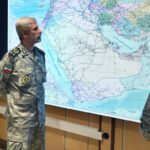During the last nine months of the war in Gaza, Nora al-Batran was pregnant with twins. The 38-year-old woman was repeatedly displaced with her husband and children as they dodged bombs and gunfire and sought shelter in a tent in the town of Deir al Balah.
On December 6, al-Batran gave birth to her twins, Jumaa and Ali, at the city’s Al-Aqsa Hospital.
But two weeks later, Jumaa died of hypothermia as the cold set in and al-Batran struggled to keep her babies warm under the fabric tarps of her tent at night.
“Because of the cold, my children stopped moving, they stopped breastfeeding,” she told independent videographer Mohamed El Saife of the CBC. “It’s very difficult… It’s very cold.”
Cold weather and heavy rains have hit much of the Gaza Strip in recent weeks, leaving many Palestinians living in tents in danger from the elements, with one father digging a hole under his tent to provide shelter for his family .
Jumaa was among eight babies who died of hypothermia in recent weeks, according to Dr. Ahmed al Farra of the Nasser Medical Complex.
During the second winter of the war in Gaza, weather conditions added an additional element of suffering to the hundreds of thousands of displaced people.
Jumaa al-Batran was born on December 6 with his twin brother, but due to bad weather in Gaza, Jumaa did not survive a hypothermia attack.
Temperatures drop to between 10°C and 15°C at night in Gaza at this time of year.
A report According to a January publication by UNRWA, the United Nations Relief and Works Agency, babies are dying from hypothermia due to lack of access to basic goods who are unable to cross the border to reach the civilians of Gaza.
“Supplies needed for their protection have been blocked in the region for months, awaiting approval from Israeli authorities to enter Gaza,” it reads.
Infants are at higher risk of hypothermia because they lose heat more quickly than adults. Many had to spend hours in the cold and wet due to Gaza’s climate, two problems that can lead to hypothermia, according to to health professionals.

Sitting in her tent, her son Ali in her arms, al-Batran remembers the day she found Jumaa’s lifeless body next to her.
She said that the night before she had wrapped Jumaa in as many blankets as she could find, leaving only his nose exposed so he could breathe, and placed a hot water bottle in his blankets in an attempt to keep it warm.
“I woke up at 6am and found my son was blue and frozen. He was no longer breathing,” al-Batan said. “I felt guilty that my child died in front of me because of the cold and I couldn’t do anything for him.”
Tayseer Obeid says he hopes the 1.5 meter deep hole he dug under his tent will protect his children from the cold, but it cannot protect them from the war.
The eight babies who died were all less than a month old, said al Farra, head of the pediatric department at Nasser Hospital in southern Gaza.
“The situation is very critical and very serious. [Newborns] are not able to protect themselves from severe hypothermia because they are fragile babies,” he explained to El Saife.
Babies more prone to hypothermia
Al Farra said these babies are already prone to hypothermia even though they live in heated buildings. “So what will happen when they are in a tent with no furniture, no electricity, no fuel to keep warm?”
Every day, al Farra said, he sees four to five babies suffering from hypothermia at Nasser Hospital.
While the hospital does everything it can to warm babies and advise parents on how to keep them warm, he said some arrive already dead, like Jumaa.
Al-Batran is one of hundreds of mothers trying to survive the winter with their families. She said her older children slept close together, using their body heat to keep warm while she focused on one-month-old Ali.
“The nights are very cold, people live in makeshift tents, every time it is too windy it rains inside their tents,” said Amanda Bazerolle, emergency coordinator for Doctors Without Borders. , to CBC News.
Bazerolle said that last winter many displaced people were in Rafah, where buildings were still standing and people could shelter.
“Today most of the population is sheltering in tents or makeshift tents, so they are much more at risk, much more exposed to the elements,” Bazerolle said.

In a message to XIsrael’s official unit responsible for coordinating humanitarian initiatives, COGAT, said it was working with partners to “facilitate the delivery of essential supplies and winter equipment to Gaza.” The message goes on to say that 8,400 tons of winter items have entered the Gaza Strip over the past three months, “including heating equipment, blankets, coats and clothing.”
Sheltered from the cold
In Khan Younis, a worried father tries to protect his children from the cold by going underground.
Tayseer Obeid dug a hole two meters wide and 1.5 meters deep under his tent to give his 10 children shelter from the bad weather.

The holes, which people describe as “grave-like,” are covered with plastic sheeting to try to prevent sand from falling on the family.
He built shelves to hold the family’s meager belongings and sand stairs so the children could get in and out more easily.
On the surface, he set up two tents to shelter his family. Both have only plastic sheeting to cover themselves. In the midst of all this, he made two swings for his children to play on. He said it took him 60 days to dig the hole.

“It has been a daily routine for me. A difficult and exhausting daily routine,” he told El Saife. “The ground is hard and resilient, and there were days when we were just tired.”
Back in Deir al Balah, al-Batran holds his surviving son, Ali.
The one-month-old baby is wrapped in many blankets after his last visit to the intensive care unit at Al-Aqsa Hospital and is showing symptoms of hypothermia.
With few options at her disposal, the mother relies on hot water bottles placed in her blankets to keep the baby warm. But these only last a short time before they cool down.
She said she fled the war in northern Gaza and faced destruction, cold and hunger in central Gaza.
“How can we live like this?” she said. “How do I keep my children warm?”









